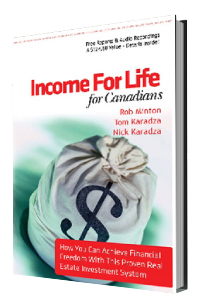Rental Lease Agreement: Changes For Ontario Legal
When it comes to dealing with a rental lease agreement it is important to ensure you are up to date on Ontario Laws. Here is a summary of some changes you need to be aware of...
Rental Lease Agreement
The biggest fear of every new real estate investor, is what to do if the tenant with a rental lease agreement doesn’t pay the rent.
Most have heard some sort of outrageous eviction story from the friend of a relative at a family BBQ, and think that the Ontario Landlord and Tenant Board is almost good for nothing.
When in fact, the opposite is true the majority of the time.
Eviction for non-payment of rent is a fairly straightforward process.
There can be exceptions, especially for landlords that have sub par properties, which have a better chance at being condemned than rented again. But barring anything totally out of the ordinary, if it can’t be proven that rent was paid, the order for the tenant to vacate the property is put into place.
Normally, the slowest part of the process is waiting to get a hearing date, as sometimes there is a backlog of cases.
This was one of the things that was addressed in mid 2011 when Ontario passed the Strong Communities Through Affordable Housing Act, and is now in place at the LTB. With the new rules, there will be dedicated days to hear cases dealing with non-payment of rent.
To speed up the process even more, any cases that are not disputed are dealt with by a “duty member,” since there is nothing to discuss. So it is definitely a more streamlined process, which is a good thing.
However, there is one change to the process which you need to be aware of.
There is a form required if you are attending one of these expedited hearings. It is a simple two page form and can be found at www.ltb.gov.on.ca. It is called “L1/L9 Information Update as of the Hearing Date Form.”
Essentially it is just an outline of any amount owed as agreed upon on the rental lease agreement as of the date of the hearing so that the accurate judgement can be awarded.
We should take a minute to put all this talk about eviction in context though.
Mark Weisleder, a Toronto lawyer and author on many real estate, told us that the fear of eviction is really overblown.
He gave us some approximate numbers for 2010 which explained that out of 1,000,000 rental properties there were about 40,000 - 50,000 non payment of rent issues at the Landlord Tenant Board.
Of those, about 20,000 went to the sheriff for eviction.
That is only 2%!
As most real estate investors find out, the things that they feared most when it comes to dealing with matters pertaining to a rental lease agreement are really not much to worry about at all.
There is some other good news for investors that came into effect. It’s no secret that there is a lack of affordable housing in many areas. The fact that many cities started outlawing second units in homes in recent years, didn’t help either.
If you were a homeowner looking to rent a basement apartment, or an investor trying to maximize cash flow, you were simply not allowed to in a growing number of cities.
This was partially understandable since many landlords don’t care for their properties, do substandard renovations, and risk the safety of the people in the property.
But the laws hurt the good investors and created a larger shortage of affordable housing.
At the beginning of the year it became mandatory for every municipality in Ontario to have bylaws that allow secondary rental units in a property. Some already have them in place and some have begun working on the process and have still not finalized the details.
The provincial government sees this as a way of providing more affordable housing, without having to dish out any money themselves. This is because a one or two bedroom basement apartment will often rent for less than a similar sized unit in a condo or apartment.
It is also great news for investors as they can substantially increase the cash flow on a property by renting out two units instead of one.
Of course there will be guidelines to follow and certain restrictions.
These will vary community to community. So before you start down this path, make sure you reach out to the city to get all the details in the area you are investing, and double check to make sure they have been finalized.
In most areas the local Planning Department would be a good place to start. If they can’t help you, they should be able to guide you in the right direction.
The need for housing will always exist, and as that need increases, so do the opportunities for all of us.
Business principle number one, is to offer something that people actually want. As real estate investors, we’ll always have that one covered.
Return from Rental Lease Agreement page to the Real Estate Investing Guide by clicking here.
Some Cool Free Stuff...
Step 1:
|
Grab a free digital copy of our real estate investing book, Income For Life For Canadians, right here. This book has been downloaded over 22,597 times and has helped hundreds of investors kick-start their investing with simple and straight forward strategies that you can implement right here in Canada. |
 |
|
You'll also receive our weekly [Your Life. Your Terms.] email newsletter with the latest investing updates and videos. |
Step 2:
|
Free Weekly Investing Videos & Articles: Get the latest updates and join the over 10,000 other Canadians enjoying the weekly [Your Life. Your Terms.] email newsletter. The email is sent out each Thursday. And as a little bonus we'll give a FREE digital copy of the book, Income For Life For Canadians, too! |
Your Life. Your Terms.
Step 3:
|
Free LIVE Investing Class: Do you live in the Greater Toronto or Golden Horseshoe Area? Come out to our next introductory "Investing in Nice Homes in Nice Areas" Real Estate Class. |
 |
|
It's 90-minutes and you'll learn a ton - promise!Thousands of investors have now joined us for this class and the feedback has always been amazing. |



